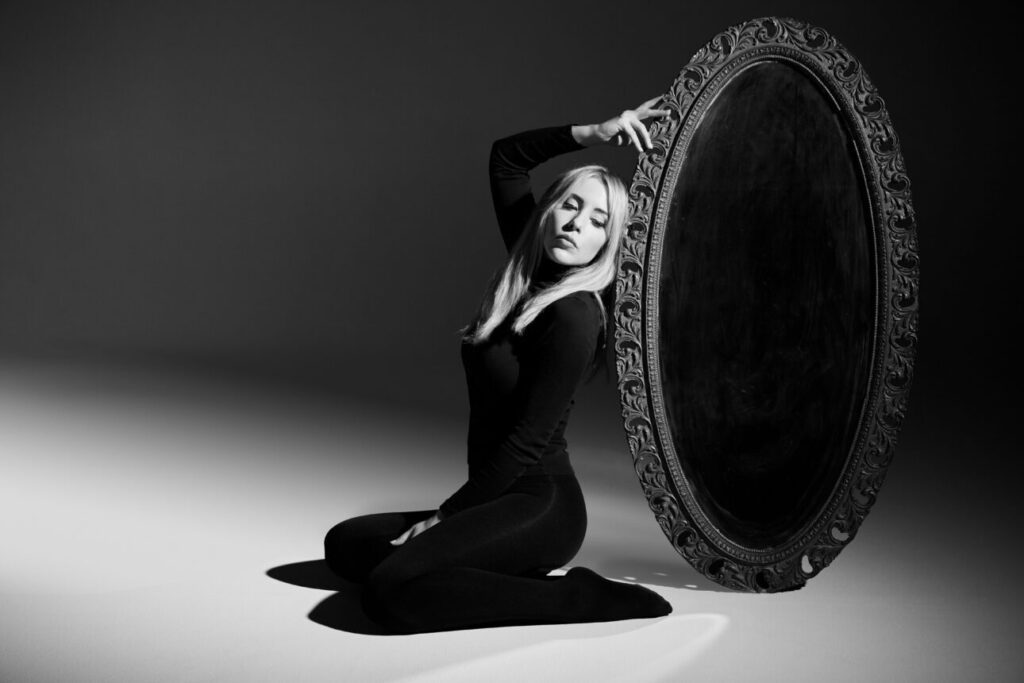
By the sound of her upcoming album, Me Veo, and the smoldering late-60s-French-pop-sounding song, “Hungry,” you wouldn’t guess that Brie Stoner would be calling from Grand Rapids, Michigan. Like much of Me Veo, releasing in May, “Hungry” is a study in melodic sensuality, a Serge-Gainsbourg-inspired, English/French-speaking (yes, speaking, at times) tale of longing and desire.
“The influences that you’re hearing are very real,” she says, referring to the songs on Me Veo as “nods of deference and respect to artists that inspire us.” Brie says “Hungry” is more about permission than anything else.
“Permission to feel our desire fully as women in a very unapologetic way,” she explains. “I feel like there’s something in that at this moment. We’re really stepping into this fullness of no longer apologizing for what we want, how we want, or how much we want.
“It’s this coquettish wink of being flirty, of not taking ourselves so seriously, that we can’t be self-reflective or laugh, but also being completely tenacious about what we want.”
Born in America, Brie’s family moved to Spain when she was eight months old. Fluent in both English and Spanish, she speaks just enough French to be, in her words, “passable.” When listening to “Hungry,” it seems Brie knows all the words she needs to know to get her point across.
“This record for me is about a homecoming into finally feeling permission to be more than one thing. I’ve always been told I have to choose between either or categories as a woman, like be intellectual or be artistic. Be grounded or be driven, be spiritual or be sexual, be a mother or a lover.”
Is this a universal hunger?
Brie Stoner: I think it’s universal for anyone who has ever felt that their hunger or desire is a problem. Even though, obviously, I’m rooted in my own experience as a woman, I do believe that it can be universally appealing to everybody who has ever been told that the shape or the direction or the texture of their desire is wrong. I also feel that there’s universal themes in the song, because ultimately it’s about not being able to get enough of somebody when you’re in that phase of just that delicious lust of like, “Oh my God, I cannot keep my hands off [of you].” I think that is a universal experience.
I kept picturing that moment as I was writing the song of being in an elevator with somebody and there’s another person in the elevator and you’re just holding back. Then the other person leaves the elevator, the doors closed and you’re just [going] at it. [laughs]
How did “Hungry” end up in the Ralph Lauren Spring 2024 runway show?
Huge thanks to my sync team MediaHorse that pitched the song. As artists, you’re used to riding the wave of, “Oh, this might happen, but let’s see if it does.” When I got a call this past August saying, “Hey, they’re going to use your song on the runway show, opening night in New York.” I was like, “Okay. I’ll believe it when it’s real.” [laughs]
It really wasn’t until that night, until I watched it live along with the rest of the world when it happened. To actually see these models walk down the runway to my music was unbelievable.
When did you decide it was time to devote yourself to your music?
The pandemic was a real turning point for me. At the time, my creativity, my songwriting, was somewhat relegated to the sidelines. I’ve gotten big placements over the years and I’ve always been grateful for it, but didn’t fully give myself permission to pursue a career as an artist. It was the full stop of that moment in which I reckoned with who do I really want to be, and if I don’t seize this moment now, then will I ever?

How did your producer play a role in bringing the sultry sound of the record to fruition?
David Vandervelde, I’ve been making [music] with him since we were teenagers. I just can’t say enough about the gift of finding the right people to work with.
He immediately got where I was headed with “Hungry” and his rhythmic choices he added I really feel showcase his giftedness as a producer. A lot of people are getting to know him and see him as the incredible guitar player on most of Father John Misty’s music. He’s becoming quite the staple with [Father John Misty], but I hope the world sees his brilliance as a producer as well.
I think what you leave out sometimes is more important than what you put in.
Yes. Especially in production. Especially in today’s version of production where it’s just such a barrage of glittery, shiny tools and, “Oh, look what this plugin can do and look what that plugin can do.”
I think that that deep appreciation for the analog and for the Lo-fi and for the “Play it till you get it right, don’t just patch things together,” really pay attention to groove, are gifts both David and I learned in those early days with Jay [Bennett from the band Wilco]. I think that that comes through in the song, because there’s a lot of just tasteful restraint and unhurried groove, it’s just like we’re taking our time. Nobody’s in a rush.
Tape is a completely different experience. It can be slow and unpredictable and imperfect.
Over the years I’ve gotten really into mindfulness and meditation and I’m no longer religious by any sense of the term. I do feel that through my experiences and through being in and with my body and really slowing down and learning how to not leave the moment, that’s really fucking sexy.
Because being with sensation in your body and not running away, not being distracted, not being in denial, all those things are sensual. It’s very erotic.
To see our running list of the top 100 greatest rock stars of all time, click here.
